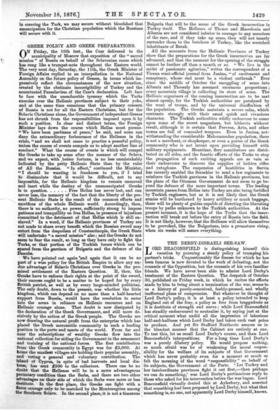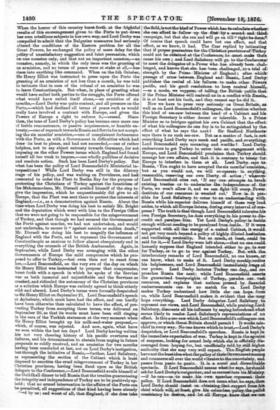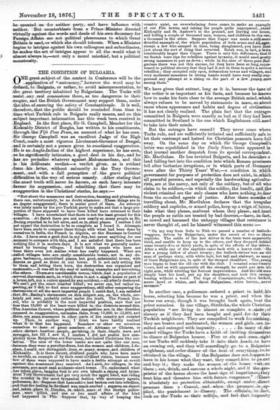THE DERBY-DISRAELI SEE-SAW.
LORD BEACONSFIELD is distinguishing himself this vacation by pursuing a steady policy of trumping his partner's tricks. Unquestionably the finesse for which he has been famous is now devoted to the work of defeating, not the counsels of the Opposition, but the counsels of his own familiar friends. We have never been able to admire Lord Derby's treatment of the Eastern Question. The despatch of October 30, published on Friday week, in which he recites the efforts made by him to bring about a termination of the war, seems to us a history of poorly-conceived, feebly-pressed, and wholly ineffectual plans of compromise. But whatever be thought of Lord Derby's policy, it is at least a policy intended to keep England out of the fray, a policy as free from braggadocio as it is destitute of strength and nerve ; while Lord Beaconsfield has steadily endeavoured to neutralise it, by saying just at the critical moment what undid all the impression of laborious half-and-halfness which Lord Derby had taken such vast pains to produce. And yet Sir Stafford Northcote assures us in the blandest manner that the Cabinet are entirely at one. To test this, let us recall Lord Derby's course, and then Lord Beaconsfield's interpositions. For a long time Lord Derby's was a purely dilatory policy. He would propose nothing, so much afraid was be of weakening the moral respon- sibility for the welfare of its subjects of that Government which has never probably even for a moment so much as felt the meaning of the word "responsibility" on behalf of
its subjects, the Government of the Porte. Let Turkey and her insubordinate provinces fight it out first,—then perhaps we can do something,' was Lord Derby's pertinacious reply to those who asked for his intervention before the war began. Lord Beaconsfield virtually denied this at Aylesbury, and asserted that something had been proposed by Lord Derby, but what that something is, no one, not apparently Lord Derby himself, knows.
When the horror of this country buret forth at the frightful results of this encouragement given to the 'Porte to put down herown rebellious subjects in her own way, and Lord Derby wait compelled to admit that the Bulgarian massacres had seriously.' altered the conditions of the Eastern problem for all theel Great Powers, he exchanged the policy of mere delay for the' polibr of unsatisfactory suggestion and faint persuasion, which on one occasion only, and that not an important occasion,—an- occasion, namely, in which the only issue was the granting of an armistice, and no terms of peace were at stake at all,—has risen unto anything like command. When on the 5th October, Sir Henry Elliot was instructed to press upon the Porte the granting of an armistice of not less than a month, he was told to intimate that in case of the refusal of an armistice he was to leave Constantinople. But when, in place of granting what would have suited both parties to the struggle, the Porte offered what would have suited itself alone,—an armistice of six months,—Lord Derby was quite content, and all pressure on the Porte,—which had declined all terms of peace such as would really have involved a contract with Europe, and given the Powers of Europe a right to enforce it,—ceased. Since then, the tone of Lord Derby's policy has become once more one of feeble remonstrance, or passive acquiescence, or humble en- treaty,—one of reproach towards Russia and Servia for not accept- ing the six months' armistice,—one of complaisant forbearance with the Porte, as with a Government in difficulties which had done. its best to please, and had not succeeded,—one of rather helpless, not to say abject entreaty towards Germany, for not imposing on the other Powers terms which England had found herself all too weak to impose,—one wholly guiltless of decisive and resolute action. Such has been Lord Derby's policy. But what has been the policy of Lord .Beaconsfield's Ministerial in- terpositions While Lord Derby was still in the dilatory stage of his policy, and was waiting on Providence, and hadt consented to order the Fleet to Besika Bay for the purpose of protecting the Christians of Turkey against the fanaticism of thmMahommedans, Mr. Disraeli availed himself of the step to give the impression, which he unquestionably did give to all Europe, that the Fleet was sent there to protect the interests of England,—i.e., as a demonstration against Russia. About the time when Lord Derby was doing his best to satisfy Mr. Bright and the deputation which went with him to the Foreign Office that we were not going to be responsible for the misgovernment of Turkey, and that though we had secured the Government of the Porte against murder, we had not undertaken, and would not undertake, to secure it "against suicide or sudden death," Mr. Disraeli was doing his best to magnify the influence of England with the Porte, and to represent the Government of Constantinople as anxious to follow almost obsequiously and in everything the counsels of the British Ambassador. Again, in September, while Lord Derby was arranging with the other Governments of Europe the mild compromise which he pro- posed to offer to Turkey,—but even then not to exact from her,—Lord Beaconsfield, on the very eve of the day on which Sir Henry Elliot was instructed to propose that compromise, burst forth with a speech in which he spoke of the Servian war as both immoral and unjustifiable and the Servians as crashed, and ridiculed the autonomy of the Christian provinces as a solution which Europe was entirely agreed to think utterly wild and absurd. Lord Derby's terms were formally despatched to Sir Henry Elliot on September 21. Lord Beaconsfield's speech at Aylesbury, which must have had the effect, and can hardly have been otherwise than calculated to have the effect, of pre- venting Turkey from accepting these terms, was delivered on September 20, so that its words must have been still ringing in the ears of the Turkish statesmen at the very moment when Sir Henry Elliot brought up his milk-and-water proposal,— which, of course, was rejected. And now, again, what have we seen within the last ten days ? Lord Derby having written his not very cheering history of his pacific overtures and failures, and his determination to abstain from urging in future proposals so coldly received, and an armistice for two months having been concluded at last, not on Lord Derby's instigation, hut through the initiative of Russia,—further, Lord Salisbury, as representing the section of the Cabinet which is least disposed to sanction the cruel misgovernment of Turkey in her Christian provinces, having been fixed upon as the British delegate to the Conference,—Lord Beaconsfield avails himself of the Guildhall dinner to tell Russia that the treaties guaranteeing the integrity and independence of Turkey are to be positively up- held ; that no turned intervention in the affairs of the Porte can be permitted; all suggestions of that .kind , having been already 4 by us; and worst,of all, that,Englandiif dodoes take the field, is uotIthelindtof Powert whiohasa to,caloulatearheilseni she can afford for follow up -the f flaby) areeeondisindt;tiirde campaign, but that she can and will go on fight.bealoneit Of course that speech could have but one effect, and that effect, as we know, it had. The Czar replied by intimating that if proper guarantees lorthe Christian provincemorThrkey could not be obtained at the Conference, he must-, make theit cause his own ; and Lord Salisbury- will go. to thm-Oonferencer to meet the delegates lof: a Power who has already been. °hal.- lenged, and knows that- she ham been. challenged,. to la -trial of: strength by the Prime Minister of' England; after which.' passage of arms, between. England and Russia, Lord Derbyr publishes the recital of. him failures. to- make other Powers pacific, and his good. resolutions to keep neutral himself, —as a mode, we supposes of telling. the British, public that.. if the Prime Minister will embroil us,in-a oonflict with Russia, it is at least not his fault, and they cannot say he did it. Now we have to press very seriously on Great Britain, as well as on Lord Beaeonsfield's colleagues, the question whether this kind of see-saw between the head of a Cabinet and hie, Foreign Secretary is either decent or tolerable. Is a Prime. Minister so to intrigue against his own Cabinet that the effect of what his colleagues-do one day is to be extinguished by the effect of what he says the next? Sir Stafford Northcote' says there is no such see-saw. But as a matter of fact, is not.
everything Lord- Derby says meek and pacific, and everything.. Lord Beaconsfield says menacing and warlike ? Lord • Derby. endeavours to get Turkey to enter into an engagement with.
Europe, and Lord Beaconsfield proclaims that Turkey, should. manage her own affairs, and, that it is contrary to treaty. for. Europe to interfere in them at all. Lord Derby says to. Russia, 'You ought to have accepted the six months', armistice,: but as you would. not, we will co-operate in anything reasonable, reserving our own liberty of action ; ' whereon Lord Beaconsfieid cries out, 'If any one attempts to break. existing treaties or to undermine the independence of the.
Porte, we won't allow it, and we can, fight till every. Power destitute of our resources is wearied out.' How- is it pos.- Bible for Lord Salisbury to come to an-understanding with Russia while his superior. delivers himself of these very loud asides, to which all■Europe. listens, during every interval of sum. pense The tanthis-that though Lord Beaconsfield tolerates his own Foreign Secretary, he does everything in his power- to dim.- credit and paralyse him. Yet Lord DerVapolioy is 'feeble enough without needing to be paralysed from inside. If it-were: supported with- all, the,- energy of a united Cabinet, it would not get very much. beyond a policy of highly diluted hesitation and vacillating neutrality. But so much, at least, could be said for it,—if Lord Derby were left alones—that no one could honestly suppose that England intended either to go to war for Turkey, or to go to war against Turkey. But. with the interlocutory remarks of Lord Beaconsfield, no one knows, or can know, what to make of it. Lord Derby meekly .recites his helplessness, and Lord Beaconsfield immediately brags of our power. Lord Derby lectures Turkey one day, and re- proaches Russia the next; while Lord Beaconsfield asserts the guaranteed treatprights of Turkey, parades our vast resources, and explains that nations pressed by financial embarrassments can be no match for us. Lord Derby. makes Turkey understand how little she can hope from us, while Lord Beaconsfield makes it evident that she may hope everything. Lord Derby delegates Lord Salisbury to represent our views, and Lord Beaconsfield, while praising,Lord.
Salisbury, discounts all his influence by saying beforehand what seems likely to render Lord Salisbury's representations of no effect. Is this-a see-saw-whioh Lord Beaconsfield's colleagues can approve, or whichGreat Britain should permit ? It works mis- chief in every way; No one knows which to trust,—Lord Derby's despatches, or Lord Beaconsfield's speeches. Russia is kept in the immediate expectation of war. Turkey is kept in the agonies of suspense, looking- for armed help which she is officially °enraged from hoping for, but unofficially told by still higher authority that she may very well expect. The English people have not the least idea what the policy of their Gevernment means; and commerce all over the world vibrates to the uncertainty, and passes from panic to panic. It is a novel and discreditable spectacle. If Lord Beaconsfield means what he says, he should ask for Lord Derby's resignation, and so reconstitute his Ministry —if he can—as to make his own speeches represent their policy. If Lord Beaconsfield does not mean what he says, then Lord Derby should insist on obtaining that support from his chief which will; at least, give his colourless policy the pallid consistency he desires, and let all Europe know.that we can.
be counted on for neither party, and have influence with neither. But counterblasts from a Prime 'Minister directed virtually against the words and deeds of Ihis,own Becretary:for Foreign Affairs are not political phenomena to which Great Britain is used, or which she should tolerate. When a Minister begins to intrigue against his own colleagues.andaubordinates, he makes the art of 'intrigue appear to all -the -.world what it almost always is,—not only a moral mischief, but a political monstrosity.








































 Previous page
Previous page